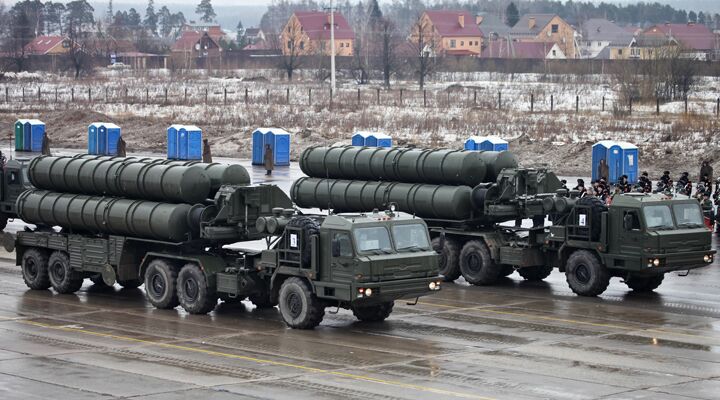
Putin Green-lights Milestone Weapons Sale to China
Russian President Vladimir Putin has approved the sale of Russia’s latest S-400 Triumf air defense guided missile system to the Chinese military, according to reports last week.
Beijing first tried to buy the advanced anti-aircraft weapon system back in 2011, but negotiations stalled in part because Russia was concerned that China would copycat the technology, and in part because Russia wanted to ensure that it could provide an ample supply of the high-tech systems to its own military before selling it to any other nation.
But now, in the aftermath of Moscow’s occupation and annexation of the Crimean peninsula, Putin has new impetus to shore up Russo-Chinese ties, economically and militarily. This newfound impetus has reshuffled his priorities and trumped his other concerns.
As a result, China stands poised to buy enough of the systems to equip up to four battalions of the People’s Liberation Army. Such a quantity, according to the military news website Huanqiu.com, would give China a strategic advantage in both the Taiwan Strait and the airspace above the Diaoyutai/Senkaku islands, which lie at the center of an increasingly tense dispute between Beijing and Tokyo.
This video made by Almaz-Antey—the Russian firm that makes the system—shows cgi demos of its purported capability. Note that the aircraft and ships being targeted look suspiciously like American models.
[Although the edgy music may be an appropriate soundtrack to this hardcore missile system, you might want to turn your sound off before viewing]
So what was it that made Russia reshuffle its priorities and greenlight the milestone sale? After Putin grabbed Crimea, Western powers labeled the annexation illegal and began striving to isolate and punish Russia over it. Initially, many in the West said they thought the entire world would view the move the way they did—as barbaric behavior on Putin’s part. For example, United States President Barack Obama initially said the nations were “largely united” in believing Putin had violated Ukraine’s territory.
But Mr. Obama’s statement was almost immediately exposed as naive when China and India made clear that they supported Putin. Putin later thanked Beijing and Delhi for it saying, “We are grateful to the people of China, whose leaders have always considered the situation in Ukraine and Crimea taking into account the full historical and political context, and greatly appreciate India’s reserve and objectivity.”
Of all nations, Russia is uniquely able and willing to provide the secure source of energy needed to power China’s and India’s rapid industrial and economic growth. Russia has the oil, natural gas, uranium and nuclear technology needed to provide power for the billions of inhabitants of Earth’s two most populous countries. Russia’s geographic propinquity to China and India greatly facilitates fuel transport.
Russia has sometimes dragged its feet over energy deals with India and China, but that is now rapidly changing. Last month, Indian officials announced that they had come to an agreement with Moscow to build a $30 billion oil pipeline—the most expensive in the world—to bring Russian energy to India. The announcement was viewed as a direct result of Putin’s new look toward the East. “The recent unease in both the U.S. and Europe over Russian President Vladimir Putin’s … annexation of Crimea has only added to Moscow’s efforts to diversify its markets beyond Europe,” said John Daly, ceo of U.S.-Central Asia Biofuels Ltd. after the Indian announcement.
Not to be outdone, a few days later China announced that later this month it will finally wrap up a 10-year series of talks with Moscow about Beijing buying massive quantities of Russian gas.
Besides fuel and weapons, Russia also possesses military know-how, which Putin appears increasingly willing to share with his Asian neighbors. This willingness will be on full display in three weeks when Russia and China hold joint naval drills in the East China Sea.
To understand the significance of Moscow’s increasingly eastward gaze, and what results to expect from it, read “Asia Stands With Putin.”
